A Famous Moroccan Surf Competition Just Opened Up to Women for the First Time

It might not have the name recognition of the North Shore or the Gold Coast, but Morocco’s Atlantic seaboard boasts some of the best surfing in the world. In recent years, it has launched a number of homegrown professional surfers onto the world stage. But never a woman. Now, for the first time in its seven-year history, there is a women’s division at the Agadir Open, a countrywide surf and bodyboard competition held on on a stretch of shoreline home to Morocco’s premier breaks. The event is run by the Imourane Surf Association, a local nonprofit that counts pro Moroccan riders Ramzi Boukhiam, who is sponsored by Quiksilver, and Othmane Choufani among its members. This year, ten women took to the waves during the three-day contest, which started on March 24. Meryem El Gardoum, a 20-year-old native of Tamraght, won the surf division, outscoring four competitors in her 13-to-38 age group with a combination of wave choice, maneuvers, and style.
These women are not alone. A swell of female Muslim surfers have made headlines in recent years, from Gaza to Iran to Bangladesh. But with seven women’s competitions per year, national championships, and female members on the national team, the surfeuses from Morocco are raising the bar. Photographer Mary Mathis and reporter David Fuchs, who produced this story with Round Earth Media, were on the ground to capture several women who competed at the Agadir Open last weekend.
Photo, from left: Surfers Lilias Tebbai, 12, Kenza Guemmi, 11, and bodyboarder Ines Tebbai, 10, exit the water at Devils Rock, Tamraght.
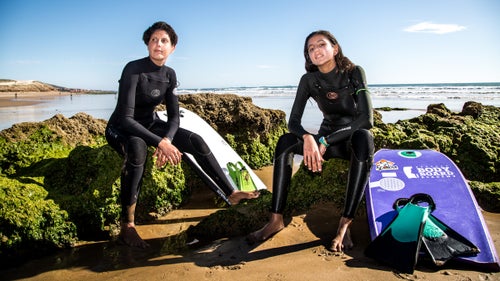
Leila Achir (left), 39, always wanted to try bodyboarding growing up, but her family never had the means. When her daughter Hiba Achir (right),14, took up bodyboarding six years ago, Achir decided to follow her into the waves. The mother-daughter duo are currently ranked fourth and third in the nation, respectively.
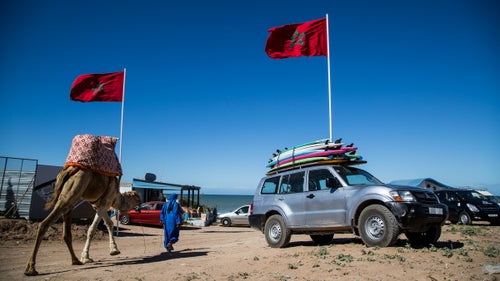
The competition took place off the coast of Tamraght, a small fishing village on the dusty coastline between Taghazout and Agadir. Surfing and surf tourism have exploded in the region, with the number of “surf camps” increasing from four to 82 over the past decade.
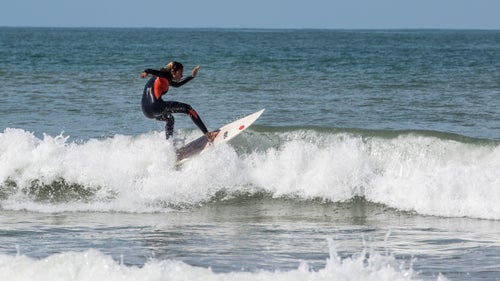
Lilias Tebbai placed second at the open, narrowly edging ahead of Moroccan surf and bodyboard legend Fatima Zahra Berrada. Tebbai, a 12-year-old from Casablanca, is currently ranked second in Morocco. She says the atmosphere in the water among female surfers is more supportive than adversarial. “They tell me when I make mistakes. They tell me not to go for the bad waves and tell me to take the good ones.”
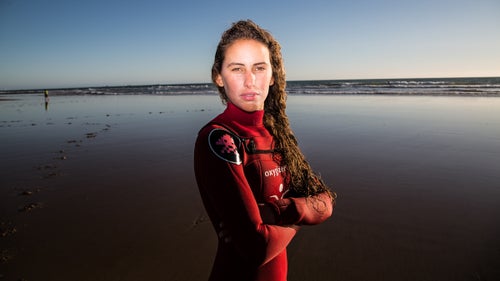
“When I meet people and they ask me where I’m from, they’re surprised,” says El Gardoum, the winner of the women’s division. “People all over the world think there aren’t female surfers in Morocco.” She believes that with support from sponsors, women could compete internationally. “I always wished that one day they would do more contests for girls,” she adds. El Gardoum hopes the addition of a women’s division at the high-profile Agadir Open will create more opportunities for female surfers to compete around Morocco, and even internationally.
Female surfers like El Gardoum also have to deal with families who have negative views of the sport: “They say if you go to surf, you’re gonna drink alcohol, you’re gonna smoke, and you’re gonna go with the boys. I don’t think it’s about that.”
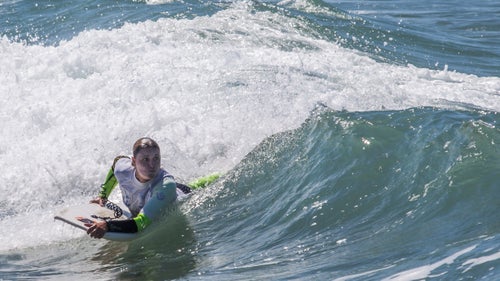
At 38 years old, Berrada is an icon for female waveriders in Morocco. When she started bodyboarding as a young woman, her mother was against it, fearing Berrada would get hurt. But after seeing Berrada’s talent in competition, her mother began encouraging her. With financial support from her parents, she placed sixth in the world at the 1998 World Championships in Portugal. In 2011, she broke another milestone as the only female member of the Moroccan bodyboard team to finish third at the world championships in the Canary Islands. Upon returning to Morocco, Berrada says that King Mohammed VI arranged for Moroccan companies to sponsor all five team members with two-year salaries, making her the only female Moroccan bodyboarder or surfer to have earned a living wage from her sport.
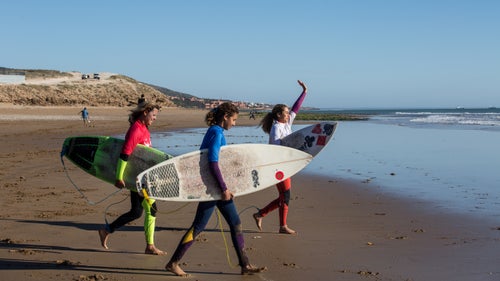
“I’ve been competing for years, and now this is the first time my daughters have competed with me,” says Berrada, who picked up surfing while pregnant with her second daughter, Kenza Guemmi. “Since I had my daughters, I’ve dreamed of them competing with me. I hope they’re going to continue and that this will motivate them.” Above, from left: Berrada, Lilias Tebbai, and Berrada’s older daughter, Ghita Gemnmi, 16, head out to compete in the semifinals.

Meryem Naouma, a 17-year-old surfer from Tamraght, is ranked ninth in Morocco. She says she has never experienced any pushback from male surfers. El Gardoum, the only other ranked female surfer from Tamraght, said that hasn’t always been the case. Only a few years ago, the local surf champ remembers having to fight with male surfers in the water to catch the waves she wanted.
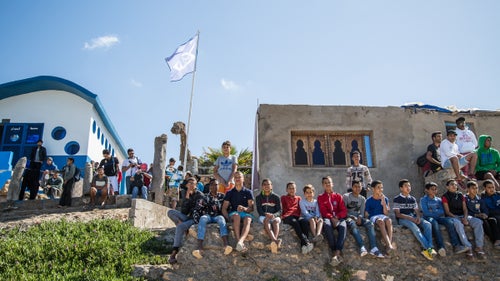
Although women were allowed to compete in this year’s competition, there’s no question that the event was a boy’s club. Of the roughly 130 competitors, only ten were women.
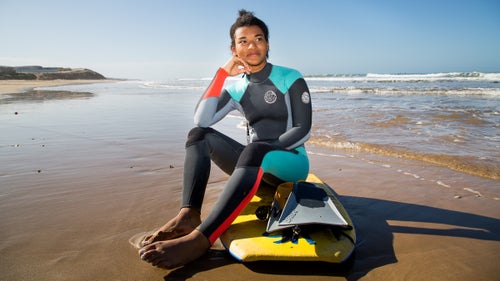
For Moroccan families, letting their daughters participate in sports—especially something as new as surfing or bodyboarding—can be problematic. More-traditional families find the formfitting wetsuits immodest and still associate the sport with hippies, drugs, and delinquency, said Hamid Islami, the coordinator between the Royal Moroccan Surfing Federation and the Ministry of the Interior. This is why the first time Oumaima Khalifi tried bodyboarding, she kept it a secret, borrowing a board from a friend. Khalifi, 19, is currently ranked eighth in Morocco, but she says it took time to gain her family’s support. Still, no one in her family has seen her compete yet.